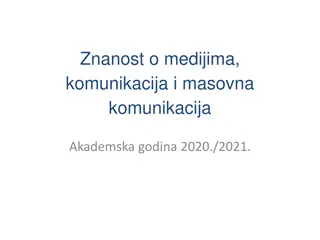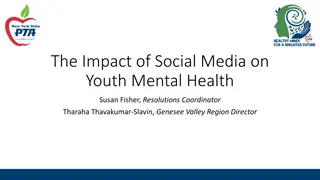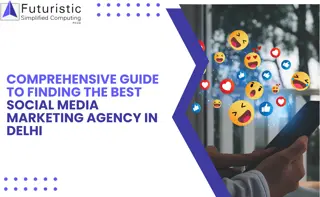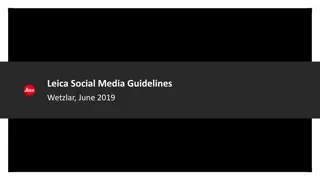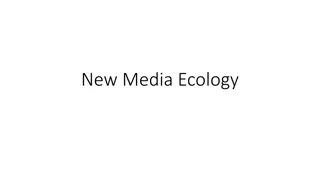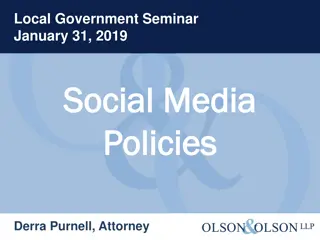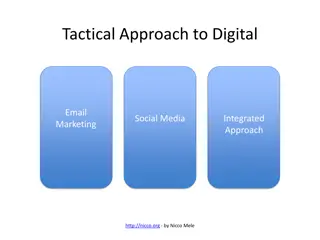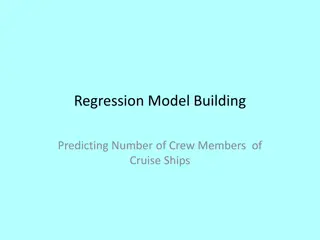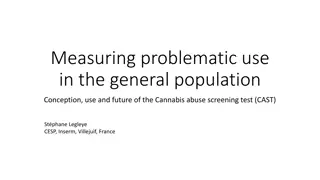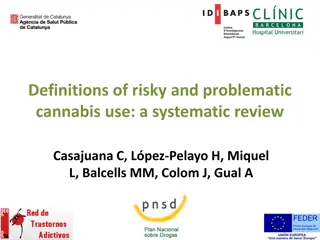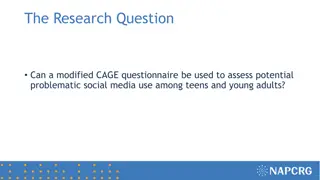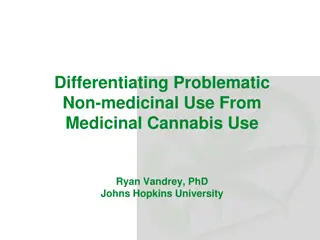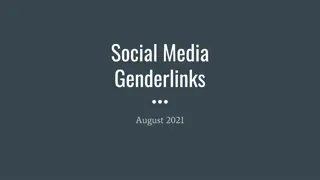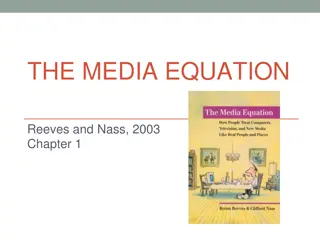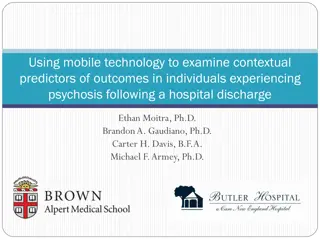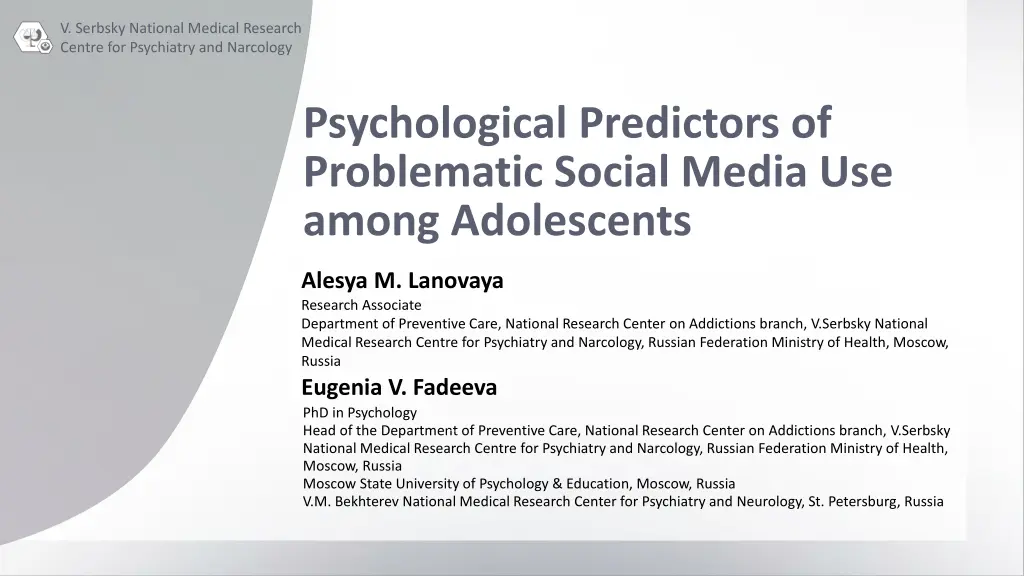
Psychological Predictors of Problematic Social Media Use Among Adolescents
This study conducted at V. Serbsky National Medical Research Centre in Russia aims to identify psychological predictors of problematic social media use among adolescents. The research involved psychological diagnostics, analysis using various scales, and a survey of school students in the Moscow Region. The results highlighted differences between groups with pronounced and minimal signs of problematic social media use, providing insights for targeted interventions and preventative measures to enhance adolescent well-being in the digital age.
Download Presentation

Please find below an Image/Link to download the presentation.
The content on the website is provided AS IS for your information and personal use only. It may not be sold, licensed, or shared on other websites without obtaining consent from the author. If you encounter any issues during the download, it is possible that the publisher has removed the file from their server.
You are allowed to download the files provided on this website for personal or commercial use, subject to the condition that they are used lawfully. All files are the property of their respective owners.
The content on the website is provided AS IS for your information and personal use only. It may not be sold, licensed, or shared on other websites without obtaining consent from the author.
E N D
Presentation Transcript
V. Serbsky National Medical Research Centre for Psychiatry and Narcology Psychological Predictors of Problematic Social Media Use among Adolescents Alesya M. Lanovaya Research Associate Department of Preventive Care, National Research Center on Addictions branch, V.Serbsky National Medical Research Centre for Psychiatry and Narcology, Russian Federation Ministry of Health, Moscow, Russia Eugenia V. Fadeeva PhD in Psychology Head of the Department of Preventive Care, National Research Center on Addictions branch, V.Serbsky National Medical Research Centre for Psychiatry and Narcology, Russian Federation Ministry of Health, Moscow, Russia Moscow State University of Psychology & Education, Moscow, Russia V.M. Bekhterev National Medical Research Center for Psychiatry and Neurology, St. Petersburg, Russia
Relevance Adolescents at risk Targeted interventions Increased effectiveness 1 2 3 Adolescents are one of the most vulnerable groups for addictive behaviors, including problematic internet and social media use Identifying psychological predictors of problematic social media use can help to develop preventive interventions among adolescents Understanding these predictors can increase the effectiveness of prevention programmes and reduce the negative impact of excessive social media use on adolescents' well-being
Purpose of the study Identifying psychological predictors of problematic social media use among adolescents
Materials and methods Psychological diagnostics Participants Analysis Problematic Facebook* Use Scale (PFUS) Purpose-in-Life Test (PIL) Emotional Empathic Tendency Scale (EETS) Depression Anxiety Stress Scale (DASS-21) Social Media Usage Duration Questionnaire (SMUDQ) Cluster analysis based on the results of the PFUS Mann-Whitney test Spearman's rank correlation coefficient for preliminary correlation analysis Linear regression analysis The study involved classroom-based self- report online survey 90 school students aged 15 from the Moscow Region 44 boys (49%) 46 girls (51%) *Owned by Meta Platforms Inc., the activity of the social network is banned in the Russian Federation on the grounds of extremist activity
Results Psychological diagnostics results Group with pronounced signs of problematic social media use n=62 Group with minimal expression of signs of problematic social media use n=28 p PFUS Total score*** 54.6 10.9 30.4 7.7 0.000 M SD PIL Goals in life** 33.3 6.6 27.9 7.7 0.002 M SD EETS Emotional sensitivity** 2.9 1.2 2.2 1 0.005 M SD DASS-21 Anxiety*** 7.5 5.5 3.2 3.4 0.001 M SD SMUDQ 6 hours or more on a weekend day n=19 16 (25.8%) 3 (10.7%) - n (%)
Results Psychological predictors of problematic social media use Reduced goal-setting skills Reduced sense of life purpose and meaning, as measured by the Purpose-in-Life Test (PIL) -coefficient -0.310, p=0.002 Decreased emotional sensitivity Decreased emotional sensitivity, which can negatively affect interpersonal interactions, as measured by the Emotional Empathic Tendency Scale (EETS) -coefficient -0.289, p=0.001 Higher rates of anxiety Anxiety, which manifested in subjective feelings of worry, unfavourable premonitions, as measured by The Depression Anxiety Stress Scale (DASS-21) -coefficient 0.475, p=0.000 Excessive social media use on weekends Longer time spent on social media (6 hours and more), particularly on weekends, as measured by the Social Media Usage Duration Questionnaire (SMUDQ) -coefficient 0.248; p=0.016
Conclusion Directions for problematic social media use prevention programmes 2 1 3 4 Self-Regulation Skills Goal-Setting Developing skills for setting life goals in the short and long term Mindfulness Emotional Sensitivity Improving emotional sensitivity Training in mindfulness and reflection Training in self- regulation skills, both behavioral and emotional
V. Serbsky National Medical Research Centre for Psychiatry and Narcology Psychological Predictors of Problematic Social Media Use among Adolescents Alesya M. Lanovaya lanovaya.a@serbsky.ru Eugenia V. Fadeeva fadeeva.e@serbsky.ru


